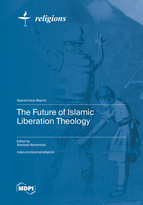The Future of Islamic Liberation Theology
A special issue of Religions (ISSN 2077-1444). This special issue belongs to the section "Religions and Theologies".
Deadline for manuscript submissions: closed (30 June 2023) | Viewed by 21301
Special Issue Editor
Special Issue Information
Dear Colleagues,
The open-access journal Religions invites submissions for a Special Issue titled “The Future of Islamic Liberation Theology”, to be edited by Dr Shadaab Rahemtulla (University of Edinburgh). As a working definition, Islamic liberation theology (henceforth ILT) refers to a broad and diverse constellation of radical theologies that seek to reinterpret Islamic texts, including (but not limited to) the Qur’an, hadith, and legal tradition, in the light of lived experiences of marginalization. Built on an abiding commitment to social justice struggles, ILT wrestles theological understanding away from the privileged center/s of society, shifting the interlocutor of theology to the neglected, and often dehumanized, margins. Over the past several decades, a rich and sophisticated body of Islamic scholarship has emerged that has hermeneutically grappled with a variety of categories and frameworks, particularly in terms of gender and religious pluralism.
The purpose of this Special Issue is to chart out new directions in ILT. What is the current state of the field? Hitherto, what are the key contexts, problems, and thematic areas that ILT has focused on and why? How have establishment religion and its hierarchies of power and authority been deconstructed, and, in turn, how have liberationist re-readings of religious texts been produced? That is, how has ILT challenged dominant hermeneutical approaches and offered more inclusive reading methods? To what extent are these alternative methods themselves problematic, carrying contestable assumptions? Which areas of human experience (class? race and ethnicity? non-binary gender identities? disabilities? ecology?) have received less attention, or have even been ignored altogether, in ILT? Looking toward the future, how can ILT begin to grapple with such thematic areas, unexplored intersectional realities, and changing global contexts, and speaking concretely, what exactly would critical theological scholarship in these new research areas look like? With regard to method, how can fresh interdisciplinary interpretive strategies be cultivated that can offer readings that are liberationist and transformative, but also critically reflexive and unapologetic? Finally, in a field that has been deeply shaped by textual hermeneutics (however contextually sensitive), what is the place of social research methods, and of the social sciences in general, within ILT? This is a non-exhaustive listing of the type of questions that this Special Issue will seek to engage.
Prior to submitting a manuscript, interested authors should initially submit a proposed title and an abstract of 400-600 words, summarising their intended contribution, by 15 September 2022. Please send this to the Guest Editor Dr Shadaab Rahemtulla (s.rahemtulla@ed.ac.uk) or to the Religions Editorial Office (religions@mdpi.com). Abstracts will be reviewed by the Guest Editor to ensure proper fit within the scope of the Special Issue. Full manuscripts will undergo double-blind peer review and should be approximately 6,000 words each.
Manuscript deadline: 1 April 2023
Abstracts deadline: 15 September 2022
Dr. Shadaab Rahemtulla
Guest Editor
Manuscript Submission Information
Manuscripts should be submitted online at www.mdpi.com by registering and logging in to this website. Once you are registered, click here to go to the submission form. Manuscripts can be submitted until the deadline.
Submitted manuscripts should not have been published previously, nor be under consideration for publication elsewhere (except conference proceedings papers). All manuscripts are thoroughly refereed through a double-blind peer-review process. A guide for authors and other relevant information for submission of manuscripts is available on the Instructions for Authors page. Religions is an international peer-reviewed open access monthly journal published by MDPI.
Please visit the Instructions for Authors page before submitting a manuscript. The Article Processing Charge (APC) for publication in this open access journal is 1200 CHF (Swiss Francs). Discounts or waivers will be provided for accepted authors who cannot secure institutional support for the APC. Submitted papers should be well formatted and use good English. Authors may use MDPI's English editing service prior to publication or during author revisions.
Keywords
- Islamic studies
- liberation theologies
- social justice
- praxis
- hermeneutics
- class
- prisons
- racialisation
- gender
- feminism
- sexuality
- empire
- decolonisation






